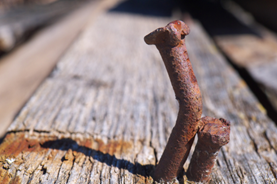The importance of fasteners in various industries
Fasteners play a crucial role in various industries, serving as the backbone of many structures and products. Whether it's construction, automotive, or manufacturing, fasteners are essential for holding components together and ensuring the integrity and safety of the finished product. Without reliable fasteners, the structural stability of buildings, vehicles, and equipment would be compromised, leading to potential disasters.
In addition to their structural importance, fasteners also contribute to the overall efficiency and performance of machines and structures. By choosing the right type of fastener and ensuring its proper installation, industries can optimize their operations, reduce downtime, and maximize productivity. Therefore, your best advantage is to use BECK’s patented Diamond Coated fasteners for all your projects. Let’s explore more.
Understanding the types of fastener failure
Fastener failure can occur in various ways, and it is essential to understand the different types
to identify and address the root causes. One common type of fastener failure is mechanical
failure, which happens when the fastener is subjected to excessive loads or vibrations, causing
it to break or become loose. Another type is corrosion, where the fastener deteriorates over
time due to exposure to moisture, chemicals, or environmental elements. Corrosion weakens
the fastener's strength and can lead to its failure.
Fatigue failure is another type that occurs when a fastener is repeatedly subjected to cyclic
loading. Over time, the repeated stress weakens the fastener, leading to cracking or complete
failure. Additionally, improper installation or inadequate torquing can cause fastener failure, as
it affects the clamping force and tightness required for proper fastening. By understanding
these types of fastener failure, industries can implement preventive measures to enhance the
reliability and longevity of fasteners.
Identifying common causes of fastener failure
There are several common causes of fastener failure that industries should be aware of. One of
the primary causes is improper design or selection of fasteners. Using the wrong type, size, or
material of fasteners can compromise their strength and performance, leading to failure.
Additionally, inadequate maintenance and lack of regular inspections can contribute to fastener
failure, as issues such as loosening, corrosion, or fatigue may go unnoticed until it's too late.
Environmental factors also play a significant role in fastener failure. Exposure to extreme temperatures, humidity, chemicals, or corrosive environments can accelerate the deterioration of fasteners and weaken their integrity. It’s important to know the environment where they will be used so you can choose the correct coating, if needed.
Exploring the impact of environmental factors on fastener performance
Environmental factors have a significant impact on the performance and lifespan of fasteners.
Temperature variations can cause fasteners to expand or contract, leading to loosening or
stress on the joints. High humidity levels can promote corrosion, especially in coastal or
industrial environments where moisture and salt are present. Exposure to chemicals, such as
acids or solvents, can also corrode fasteners and compromise their strength.
In addition to these factors, vibration and shock can also affect fastener performance. In
dynamic applications, constant vibrations can cause fasteners to fatigue and fail over time. It is
crucial for industries to consider these environmental factors and select fasteners that are
specifically designed to withstand the conditions they will be exposed to. Regular inspections
and maintenance can also help identify any issues caused by environmental factors and prevent
fastener failure.
Preventing fastener failure: Best practices and maintenance tips
To prevent fastener failure, industries should follow best practices and implement proper
maintenance procedures. First and foremost, selecting the right type, size, and material of
fasteners for the specific application is crucial. Fasteners should be designed to withstand the
expected loads, vibrations, and environmental conditions. Consulting with experts or using
industry guidelines can help in making informed decisions.
Proper installation is another key factor in preventing fastener failure. Following the manufacturer's instructions, using the correct torque values, and ensuring proper alignment are
essential. Regular inspections and maintenance should be performed to detect any signs of
fastener failure, such as loosening, corrosion, or fatigue. Prompt repairs or replacements should
be carried out to prevent further damage.
Applying protective coatings or using corrosion-resistant fasteners can enhance their lifespan
and performance in corrosive environments. Additionally, implementing measures to reduce
vibrations, such as using dampening materials or designing structures to absorb shocks, can
minimize the risk of fastener fatigue.
BECK’s patented Diamond Coated fasteners is your solution to fastener failure. Our diamond coating provides increased holding power due to reducing friction. These coated fasteners destroy fewer wood fibers which provides more support as additional stable contact points after the connection has been completed. The result: higher extraction values. It also guarantees reduced driving energy, making it ideal for resistant materials. This will make it easier to switch to lighter and smaller devices causing less fatigue for the installer as well as less wear and tear on your equipment.
Understanding the causes of fastener failure and implementing preventive measures is essential for industries to ensure the reliability and safety of their structures and products. By utilizing BECK’s Diamond Coated family of fasteners, industries can prevent fastener failure and optimize their operations. Learn more by clicking the button below.

.svg.png)
